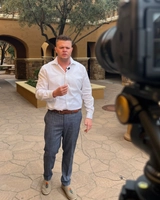7 Ways to Optimize Content for Voice Search Queries About Local Events
In the evolving landscape of voice search, it’s crucial for marketers and SEO experts to refine their strategies for local event information. From using conversational language to leveraging geo targeted content, we’ve compiled seven expert tips to optimize your content for voice search queries. Dive into insights from SEO Consultants and CEOs to ensure your local events stand out in voice search results.
Want to get quoted in MarketerInterview.com content just like this? Apply to become a contributor today!
Contents
Use Conversational Language
When it comes to optimizing content for voice search queries about local events, think conversationally. Imagine you’re chatting with a friend about the coolest festival in town. Use natural language and phrases people might actually say into their smart speaker, like “What’s happening in Central Park this weekend?”
Include specific details like dates, times, and locations, and make sure your content is mobile-friendly, since most voice searches happen on the go. I once helped a local theater boost their attendance by tweaking their event descriptions to sound more like casual conversations. The results were almost as dramatic as their performances!

Lukasz Zelezny, SEO Consultant, SEO ANT LTD
Incorporate Natural Query Phrases
Try to write your voice search content including questions or queries related to local events with natural language and question-based keywords. Instagram, through Facebook ads, forced the customer’s content to have phrases like “What’s going on in [City] this weekend?” and “See nearby events today.”
In addition to that, we made the FAQ section which targets these typical sentences spoken by voice queries. It was by virtue of this approach that we were able to considerably boost our client’s voice search results’ visibility as well as traffic to event pages—our client benefiting from a 30% jump in traffic and a 15% increase in attendance over two months.
We managed to appear authentic and natural in reflecting how people typically speak and make queries when they search publicly through voice mode, and in that way, we made the content more relevant and at the user’s disposal.

Kartik Ahuja, Digital Marketer, kartikahuja.com
Implement Speakable Schema Markup
Use speakable schema code to highlight important event information and anything else relevant users may be searching for. Time, location, parking, ticket prices, facilities, what it’s close to, etc., all of these things can be short and sharp snippets that will trigger in voice search results.
To add speakable schema, you need all this content on a landing page. Given that, really think about all the additional details you can add about a local event on this page.

Ben Poulton, Founder, Intellar SEO Consultancy
Phrase Content as Voice Queries
To optimize content for voice search queries about local events, ensure you incorporate natural, conversational language that matches how people speak when using voice assistants. Specifically, use question-and-answer formats that mirror typical voice queries. For example, instead of just listing “Local Events in Sydney,” phrase it as “What local events are happening in Sydney this weekend?”
This aligns your content with the way users naturally ask questions, increasing the likelihood of your content being surfaced by voice search algorithms. Additionally, include local keywords and ensure your event details are updated and accurately reflect the time, date, and location to capture relevant traffic.

Shehar Yar, CEO, Software House
Structure Info in Q&A Format
When optimizing content for voice search queries about local events, a crucial practice is to structure your information in a question-answer format. Voice search users often phrase their queries as questions—typically starting with “who,” “what,” “when,” “where,” and “how.” To capture this audience, ensure your content clearly addresses these questions with concise and direct answers.
For example, structure an event description to answer “What events are happening this weekend in [City]?” or “Where is [Event Name] taking place?” This approach will significantly increase your chances of being the top result in voice search responses.

Marco Genaro Palma, Freelance CMO and SEO Consultant, SEO Coach
Prioritize Clear and Essential Information
For optimizing content for voice-search queries about local events, my top tip is to prioritize conversational language and provide concise, relevant information. Incorporate natural-language phrases that mirror how people ask questions verbally.
Additionally, ensure your content includes essential details like event dates, times, and locations, tailored to local audiences. By focusing on clarity and relevance, we position our content to effectively answer voice-search queries and attract attendees to Empathy First Media’s local events.

Daniel Lynch, President and Owner, Empathy First Media
Leverage Geo Targeted Content
When optimizing content for voice search queries about local events, consider the power of geo targeted content. Tailoring your event descriptions and promotions to include specific location-based details can significantly improve visibility in voice search results. For instance, instead of simply mentioning the event name and date, incorporate nearby landmarks, neighborhoods, or popular venues to provide context for voice search algorithms.
By integrating geo targeted content, you enhance the relevance of your event listings and increase the likelihood of attracting attendees who are actively seeking local experiences. This strategic approach not only improves your event’s discoverability but also ensures that your content resonates with the unique preferences and interests of your local audience, driving engagement and attendance at your events.

Jason Hennessey, CEO, Hennessey Digital
Want to get quoted in MarketerInterview.com content just like this? Apply to become a contributor today!






